Summary of the events of violence, oppression and resistance happening on Lesvos Island in 2020.
May
May 11: Another car is vandalised while parked on the road between Moria camp and the village. Many people bringing aid into the camp parked their cars on this road while the lockdown restrictions were in operation.
May 10: Alarm Phone reports that migrants trying to cross from Turkey to Lesvos were approached by ‘a grey-white vessel without a flag but with Greek alphabet’. Their fuel was stolen and they were left adrift. After the attack, the people in distress reported that their boat started taking in water. Alarm Phone immediately alerted the Turkish Coastguard at 8.22am who were already in the vicinity and conducted a rescue operation, returning the people to Turkey.
Nineteen people land on a beach near Adissa. Meanwhile, 137 people are transferred from Moria and Kara Tepe camps to the mainland.
While the COVID-19 measures are relaxed for the general population of Lesvos, they are extended for migrants. Moria camp remains under lockdown.
May 9: A case file is presented to Mytilene Public Prosecutor against twenty people for incidents in Diavalorama and Pagani in February 2020. The twenty were charged mostly for offences against police officers. Among the charges are some felony offences. Charges include disturbing the peace, arson, construction and possession of explosives, damage to property, attempt to cause dangerous bodily harm, transport disruption, robbery, as well as violations of gun laws.
May 8: New Democracy announces a new bill of anti-migrant legislation. The bill increases powers of automatic detention for rejected asylum seekers, extending the period of ‘pre-removal detention’ by 12 months; proposes replacing open camps on the islands with ‘closed controlled centres’; increases the number of cases where appeals can be seen by a single-judge committee; allows for asylum interviews to be conducted in a language that migrants are ‘reasonably judged to understand’ rather than their spoken language; and grants ‘secret budgets’ to the Ministry of Migration.
The old IRC structure near Eftalou will be used as a quarantaine camp for new arrivals in West Lesvos. Fifty-one people who arrived in Kalo Limani were transferred there this morning.
May 7: The leader of the Greek Solution party, Kyriakos Velopoulos, addresses parliament with deep concerns about migrants in Moria camp stealing dogs in order to eat them, as he believes that dogs are delicacies for them. He is referring to a dog that was stolen from a yard near the camp. The dog was not eaten, but is doing well and now home.
May 6: A boat carrying 51 people, among them many children, arrived in Kalo Limani, West Lesvos. It was the first boat to arrive on the island in 35 days. For now it is not clear where they will stay. The last people to arrive in West Lesvos had to wait for four weeks until they were finally transferred to Moria camp.
May 5: The Ministry of Migration proposes to build a fence around Moria and the surrounding Olive Grove. This proposal is denied by the president of Moria village, Giannis Mastrogiannis, as in his opinion this fence would make the camp more permanent, when it should be closed down.
May 4: Greek media reports another incident of migrants arriving on shore (in this case on Chios) who disappeared immediately after. Several witnesses claim that they saw the boat with twelve to fifteen people, while the Coast Guard, police, Frontex, and the hospital don’t know anything about the arrival. The next morning Turkish Coast Guard picked up a group of fourteen people from a small turkish island opposite Chios. The rescued migrants say that they were left by Greek coastguard drifting at sea without an engine.
The migrants that were transferred from Moria to the mainland could not move into hotels in Pella, North Greece, as locals held massive protests, burning the facilities. A member of Golden Dawn was allegedly present, and a journalist was attacked.
May 4: Eleftherios Douroudis, the General Police Director of the North Aegean region, announces in a press conference that police forces stationed at Reception and Identification centres had prevented the exit of migrants 27,055 times under the Corona lockdown. He also claimed that the largest number of Corona violations were due to migrants.
May 3: The Greek Minister of Migration, Notis Mitarakis, visits Lesvos and Moria camp. A group of roughly 70 locals, among them members of far-right vigilante groups, demonstrate at the Panagiouda intersection and outside Mytilene power plant. An NGO worker is beaten.
The Ministry of Citizens Protection announces an ‘autonomous police station’ in Moria, which it says will allow ‘the citizens of Moria and the neighboring villages’ to ‘calm down and feel safe’ and to ensure that ‘criminal actions will be prevented, wherever they come from’.
May 2: Finally, 391 Migrants are permitted to leave the island on the same day that Minister of Migration Notis Mitarakis visits Lesvos, where he opened the new medical structure in front of Moria camp.
The cars of NGO workers parked in between Moria village and the camp are vandalised by unknown attackers.
April
April 29: The African community in Moria camp demonstrates again following on from the previous week’s protest, demanding the immediate evacuation of the camp and the abolition of Moria pre-removal detention centre.

A man of African origin dies in Mytilene emergency room. The Initiative of Doctors of Lesvos releases a statement criticising the lack of medical attention that he received, referring to well-known racist practices in the hospital ‘undermining the value of human life’.
Several locals from Samos report witnessing an illegal pushback on the morning of April 28. Migrants that had arrived on shore disappeared. An eyewitness saw a Coast Guard vessel ready to depart towing a small liferaft. This case is similar to other reports of migrants picked up at sea by the Greek Coast Guard, put on a liferaft being towed back to Turkish waters, where they were found by Turkish Coast Guard later. In one previous case it was also reported that the people had already arrived on shore.
Meanwhile the Greek Coastguard claims that the Turkish Coast Guard tried to push a migrant boat towards Greek waters northeast of Lesvos. The boat did not reach Greek waters, but was picked up by the Turkish Coast Guard.
April 28: The Mayor of Mytilene announces that the people transferred from the Northern shore were transferred without permission and should go back, despite the fact that they were transferred to the camp by the police. The ridiculous fight between the two municipalities continues…
April 27: The Ministry of Migration issues a decision that all white cards and residence permits that expire during the closure of the asylum service will be automatically extended for an additional four months.
The villager who shot two migrants in the back on 22 April was released on parole after a court hearing. Again many of his supporters gathered in front of the court and attacked journalists in full sight of the police.
Notis Mitarakis, the Minister of Migration, announces the abolition of dozes of accommodation structures for asylum seekers. He claims that the key to “handle the flow” are mass deportations and the acceleration of the asylum process, setting the goal of examining 100,000 asylum applications in 2020. Instead of housing people in hotels and other safe places, he wants to set up “controlled and closed structures”.
Migrants trapped on the beaches and hills of North Lesvos were finally transferred to Moria camp. Arguments between two Municipalities in Lesvos over which is responsible have led to the migrants being abandoned on the beach for over one month. People who had been quarantined in a warehouse close to Kara Tepe are also transferred to Moria, exactly one month after their arrival in Lesvos. They had been held in Mytilene port for two weeks before being transferred to quarantine.
April 24: It is increasingly clear that the highly-publicised transfer of 1,500 migrants from the island today will not leave to the mainland in the foreseeable future.
Massive fires break out in Vathy camp on Samos. Many people lost their shelters.
April 23: The perpetrator of the shooting on 22 April, a man from Afalonas village, was arrested and a criminal case was filed against him for attempted murderer and violation of gun law. About 100 people gathered outside the courthouse to support him, some of whom were also present at incidences of far-right vigilantism in the previous months.
In Messolonghi (Western Greece) locals block the road to hotels that would have housed migrants transferred to the mainland from Moria camp. They argue that places should be found on Lesvos, but if the Mayor does not help they should not expect other municipalities to make people.
The highly publicised transfer of 1,500 people from Lesvos to mainland Greece is revised. Now it is likely only 400 people will be transferred.
Finally one ATM is brought to Moria. It should be installed by the end of April.
April 22: The African community invites everyone to join them in a big protest in Moria camp. They demand freedom and express their concerns about the lack of security, food and health care.
Two migrants are hospitalised with injuries from gunshots. They were shot in the back near Afalonas village, close to Moria camp.
The Vice Governor for Public Health asks landlords and the UNHCR not to rent more flats to migrants in apartment buildings with migrant tenants. He argues that nobody can control migrants moving and gathering in such a situation.
A protest of locals takes place in Petra. They demand the transfer of migrants stranded in the harbour. There does not seem to be any solution in sight, as Stage 2 transit camp is not functional and Mytilene municipality blocks their transfer to Moria camp.
April 21: About 300 members of the Hazara community demonstrate in Moria demanding justice for the death of a 16-year-old boy during a fight in the camp.
April 20: Corona virus lockdown measures for the camps are extended until May 10.
It is announced that 1,500 migrants will leave from Mytilene port for the mainland on a chartered ship. This follows a government announcement that 2,380 migrants considered to be the most vulnerable due to the Corona virus will be transferred from the islands to places rented by UNHCR on the mainland.
April 18: UNHCR starts to move migrants considered to be the most vulnerable from Moria camp due to risks from the Corona virus. Five places on Lesvos are rented: four in Thermi, and one in the area of Neapoli/Kratigos. Also some people leave by plane to Athens.
April 14: Twenty minors leave Lesvos for the mainland to go to the Germany in the near future. Twenty more migrants leave to the mainland under the responsibility of the UNHCR.
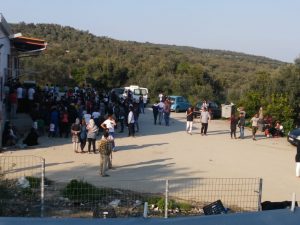
April 11: People receive the cash allowance again, but can only use it in one supermarket near the camp. Only 5 people are allowed inside. Massive queues in front of the store lead to the market being closed.
April 10: Demonstration in Moria. People demanding justice after the death of a 16-year-old boy during fights in the camp.

April 9: The house near Kara Tepe is set on fire. Fortunately the migrants living there had already left.
April 8: The hunger strike in Moria pre-removal detention centre ends after allegations of police brutality.
Masked men go to a place near Kara Tepe where migrants live and threaten to burn the building down if they don’t leave.
The closed camps in Malakassa and Serres become open camps. People will have finally the right to ask for asylum
April 7: A 16-year-old boy is taken to Mytilene hospital after being stabbed in a fight, dying the next day. Three others are injured. A paramedic accuses ambulance drivers of unprofessional behavior.
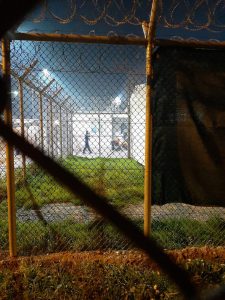
April 5: Detainees in Moria pre-removal detention centre go on hunger strike against brutal conditions in the prison, demanding their immediate release.
April 1: 2000 people from different communities gather in Moria camp to celebrate peace.
March
March 30: Tensions between the Hazara and Tajik community lead to fights in Moria camp.
March 27: The Ministry of Migration freezes the cash allowance of 90€ for migrants in Moria camp to prevent people from going to town to get money from the ATMs.
March 23: The government announces the enforcement of curfew, effective Monday morning at 6am. Henceforth, people will need a special authorization to leave their houses, and only for limited reasons including essential work, bank transactions, buying basic supplies, helping someone in need, visiting a doctor, vet or pharmacy, and for physical exercise/pet walk.
March 20: The Ministry of Migration charters a ship to transfer 129 people from Mytilene to detention facilities in northern Greece.
March 18: Movement restrictions are imposed in Moria camp. Residents are allowed to move from 7am until 7 pm, by bus only, with a maximum of 30 people per bus, and not on foot.
March 16: Another fire breaks out in Moria camp. There is at least one confirmed death of a 6-year-old child. More fatalities are suspected, but as usual not confirmed.

March 14: Two antifascist demonstrations take place at Mytilene’s central Sappho Square.
The military vessel leaves Mytilene port taking 450 migrants to camps in mainland Greece.
70 new arrivals stay on the beaches in north Lesvos.
March 10: Closure of all schools, universities, kindergartens and any other facility providing educational or recreational activities. These measures also affect all of the activities taking place inside and outside Moria camp.
A far-right Irish YouTuber arrives in Lesvos. He gets nervous and leaves on March 14.
March 9: The first positive test result of Coronavirus is detected on Lesvos.
March 7: During an antifascist demonstration, 3 Austrian fascists are spotted and forced to leave.
Later a fire destroys the ‘School of peace’ at One Happy Family community center. New Democracy MP Diamantis Karasoulas commented on Facebook ‘One happy night’, followed by a heart emoji, and ‘this is not a disaster. This is more idyllic than a sunset in Santorini’. A few days later police identify and arrest three people of Palestinian origin.
March 6: Two locals are found guilty in court after they threatened an NGO boss. They get 3-month suspended prison sentences.
March 5: Mare Liberum tries to anchor in the port of Mytilene, but has to leave again after fascist attack.
Migrants arrive in north Lesvos and must stay in the beaches, while the new arrivals in the south are held in the port of Mytilene until they are transported to camps in the mainland aboard a military vessel. Access to visitors and legal support is restricted.
March 3: As far-right paramilitaries from Greece and around Europe flock to Greece’s northern border, European Commission president Ursula von der Leyen thanks Greece for being Europe’s ‘shield’.
March 2: NGO sea vessel Mare Liberum is attacked in the port of Skala Loutron.
Foreign Nazis arrive in Mytilene, are spotted, and leave the island slightly damaged.
Two children – a young boy from Syria, and a baby from Iraq – die at sea. Migrants report that the Greek Coast Guard menaced their dinghy, causing the passengers to fall overboard, and then refused to provide them with timely assistance. The two children who were on the dinghy drowned. The little boy’s body was transferred to Mytilene and his death was reported soon after, which prompted an audacious allegation from the Hellenic Coast Guard that his family and the migrants with them had capsized their own boat. The death of the baby is still not confirmed by the authorities.
March 1: A boat with migrants arrives in the port of Thermi. Locals attack the people on board and a journalist. After many hours the police bring the people to the port of Mytilene.
Locals block the road near Panagiouda to stop new arrivals being brought to Moria camp, attacking journalists and volunteers.
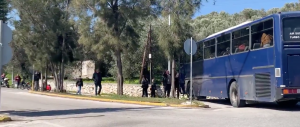
Greece announces it will suspend all asylum procedures and that new arrivals after 1 March 2020 will not have the right to ask for asylum.
The same night Stage 2 camp, now closed and empty, is destroyed by an arson attack, again under the watch of the police.
February
February 27: Volunteers working with One Happy Family are attacked in their car by a violent mob of locals.
Erdogan announces that Turkey will no longer prevent people from crossing the border and migrants are brought to the land border at Evros. People die after a violent reaction by the border force.
Activists on the beaches and in Mytilene are threatened, attacked and arrested. Many leave the island.
Attacks on migrants by police and vigilante groups increase.
February 26-27: Protests take place in Karava against the construction of a closed camp in the area. There are massive fights between protesters and MAT forces. MAT units are attacked in the military base of Pagani and leave the island the next day.
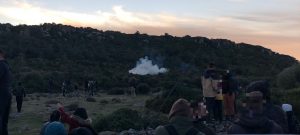
February 25: MAT units arrive by ferry from Athens to support local police forces to push through the construction of a closed structure in Karavas. Local protests block the port.

22 February: Autonomous groups organize an antiracist demonstration. Most migrants could not participate as the buses from Moria were blocked, but some attended by walking all the way from Moria.
February 5: Police officers raid One Happy Family, a community centre based between Moria and Kara Tepe camps. They check volunteers’ ID cards with the intention of finding the conspirators behind the Moria migrant demonstrations.
The same day, an investigation is launched into 7 people from Moria village for illegal use of weapons on 3 and 4 February. Although police witnessed far-right attacks as they happened, they failed to intervene until the following day.
February 4: 200 people from Moria camp return to the centre of Mytilene. Police do not allow them to protest, breaking up an attempted roadblock. Hostile locals attack migrants, Europeans and Greek supporters. That evening locals block the road into Moria village with the complicity of the police. Again attacks occur in sight of the police.
The same evening a group of antifascists march in order to take back the streets, shouting slogans such as ‘Azadi’, ‘Λευτεριά, for all detained’ and ‘Lesvos is an antifascist land’.
Around 40-50 fascists wait for the demonstration to arrive back at Epano Scala in Mytilene. Discouraged by the large number of antifascists, the group scattered into the streets and patrolled Mytilene. Fascists armed with sticks and rocks picked off a small group of people in the streets, chasing them into a bar, where they attempted to force their way in.
February 3: A massive migrant demonstration tries to reach Mytilene, demanding an end to inhuman camp conditions and protesting increased deportations. Most protesters are blocked by police, while around 200 protesters outmaneuver the blockade and reach Mytilene. On their way back to Moria camp, local people and police block the migrant protest from passing through Moria village.
That evening the village assembly gathered in the community hall, together with the Governor of Northern Aegean. The assembly gave birth to various far-right vigilante groups. The houses and offices of NGO workers are attacked. A band of masked men patrolled the streets and a van carrying migrants and NGO workers was stopped and stoned.
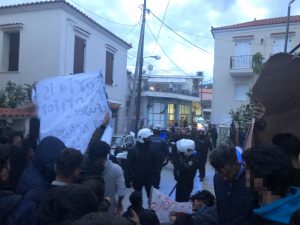
January
January 31: The mayor of West Lesvos closes down Stage 2, the transit camp in Skala Sikaminias.
January 30: Around 300 migrant women mobilize and march through Mytilene in a historic demonstration.
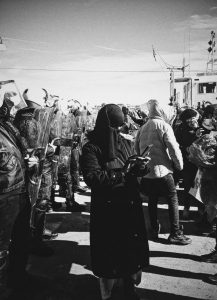
January 22: Local authorities call for a demonstration in Lesvos. Posters all over the streets in Mytilene proclaim the motto: ‘we want our island back, we want our lives back’.
January 20: An 18-year-old Afghan woman is taken to hospital in critical condition after being stabbed in Moria camp.
January 16: Demonstration in Moria camp. Three Somali men are arrested, accused of disturbing public order, threatening the police and resistance against the police. The same day a young man falls down dead after being stabbed outside Moria camp.
January 16: Around 300 people – ex-prisoners, solidarity activists and others from Moria camp – protest the PRO.KE.K.A death in Mytilene.
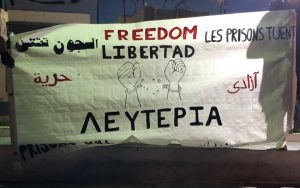
January 15: A man from Africa, who was in a critical situation after a fight in Moria camp on January 1, dies in hospital.
January 6: A 31-year-old Iranian man is found dead, hanged inside Moria prison (PRO.KE.K.A.).

